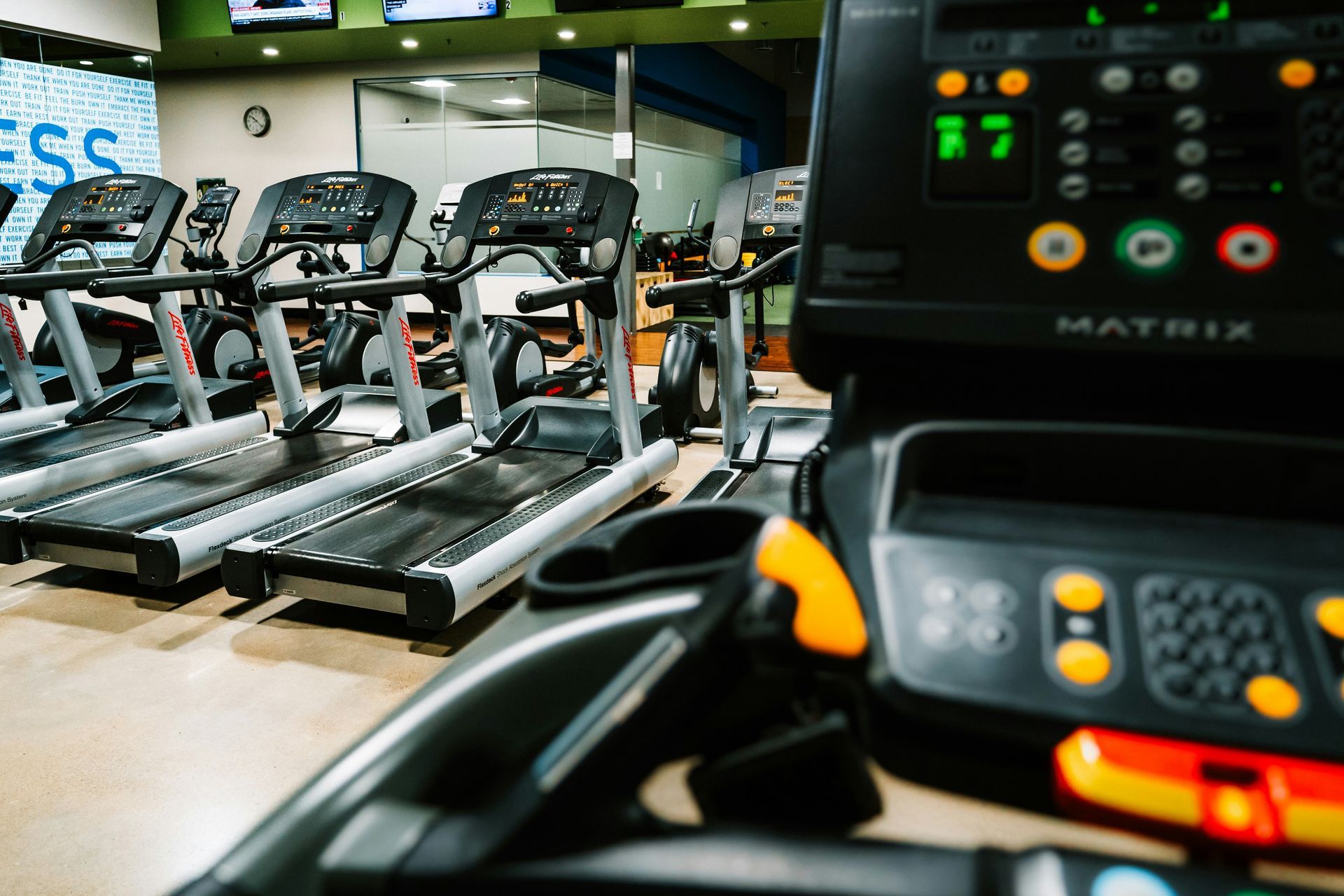Blog

By Jay Shreddinger
•
24 Apr, 2024
Maintain Your Transformation Goals While Enjoying Holidays Are you worried about maintaining your fitness journey during the holiday season? Fear not! With the right strategies and mindset, you can stay on track with your transformation goals without sacrificing the joy of festivities. Here's how: Prioritize Planning for Success To ensure you stay on track with your fitness goals during the holidays, it's crucial to plan ahead. Schedule your workouts and meals just like you would any other appointment. By making a plan and sticking to it, you'll be less likely to succumb to temptation or make excuses for skipping workouts. Embrace Flexible Eating During the holidays, it's inevitable that you'll encounter a variety of delicious treats and indulgent meals. Instead of depriving yourself completely, practice flexible eating. Allow yourself to enjoy your favorite holiday foods in moderation, but be mindful of portion sizes and balance them with nutritious options.

By Jay Shreddinger
•
07 Apr, 2024
While gym training with a partner can have its benefits, there are also potential drawbacks. Here are five reasons why it might be considered a mistake: Dependency : Relying too heavily on a training partner can hinder your ability to push yourself independently. If your partner is unavailable or loses motivation, it can disrupt your own consistency and progress. Skill Level Discrepancy : If your partner is at a significantly different fitness level, it can be challenging to find exercises that suit both of you. This can lead to frustration or even injuries if one person is pushing beyond their capabilities to match the other. Socializing Distractions : While camaraderie can be motivating, it's easy for gym sessions with a partner to become more about socializing than focused training. Excessive chatting can lengthen rest periods and reduce the intensity of workouts. Limited Variety : Training with a partner might limit your exposure to different exercises and training methods. You may become stuck in a routine that doesn't fully address your fitness goals or provide enough variety to prevent plateaus. Dependence on Motivation : If your motivation relies solely on your partner's enthusiasm, you might struggle to maintain consistency when they're not available or lose interest in training altogether if the partnership ends.

By Jay Shreddinger
•
18 Mar, 2024
Why Skipping Breakfast Might Actually Be Good For You In the realm of nutrition, the concept of skipping breakfast has been a topic of much debate. While conventional wisdom often emphasizes the importance of starting the day with a hearty meal, emerging research suggests that skipping breakfast could offer a range of benefits. Let's delve into the advantages of adopting this unconventional approach to morning eating habits.

By Jay Shreddinger
•
14 Mar, 2024
Unlocking Your Fitness Potential: The Impact of Procrastination on Health and Fitness Goals Explore the detrimental effects of procrastination on personal training goals and discover actionable strategies to overcome this habit. Learn how consistency and accountability can propel you towards achieving your fitness aspirations. Procrastination acts as a silent saboteur, gradually eroding the momentum needed to achieve optimal fitness results. Whether it's delaying a workout session or making unhealthy dietary choices, the impact of procrastination extends far beyond the immediate moment, affecting long-term progress.

By Jay Shreddinger
•
12 Feb, 2024
Understanding The Disconnect Between Exercise and Weight Loss When you're diligently hitting the gym, breaking a sweat, and sticking to your exercise routine, it's disheartening when the numbers on the scale refuse to budge. The common belief that exercise directly translates to weight loss isn't always accurate. More effort is required outside, and inside the gym to achieve results. If it were that easy, we would all be walking about with six packs! Are you truly in a caloric deficit? Weight loss fundamentally boils down to expending more calories than you consume. While exercise contributes to calorie expenditure, it doesn't guarantee weight loss unless paired with a sustained calorie deficit. Simply put, if you're not burning more calories than you're consuming over time, shedding pounds becomes an uphill battle. Tracking your food intake through a meticulous food diary and monitoring your daily activity levels can unveil potential obstacles hindering your progress. By pinpointing areas where you might be overindulging or underestimating calorie intake, you can fine-tune your approach and ensure you're maintaining a consistent calorie deficit. You're not doing the right things You will often hear about a 70/30 rule, 70% of health and fitness goals are achieved in the kitchen, and 30% in what you do for exercise, this does not discount the importance of performing correct movements, exercise techniques and sequencing. For example, if you are going to run multiple times per week wouldn't you want to know if your gait pattern is optimized? Wouldn't you want to know how to lift weights correctly without injuring yourself? We have an on-going joke in the gym I work at, that people as well as training bodyparts in the day also train their 'personality' meaning the gym is more of a social occassion than exercise retreat for them. This is where a Personal Trainer or Coach comes in handy.

By Jay Shreddinger
•
25 Jan, 2024
There's very little more that fustrates me than seeing obese parents, coupled right beside them.. their overweight/obese children. The world today is not designed for anybody to be active, a mere 200 years ago; automobiles, electronic devices, uber eats, fast food and mind-consuming short-form social media content did not exist, therefore people had more of a reason to go out, move and exercise 200 years of drastic change in our 500,000 year evolution is unprecedented, how have our bodies reacted to it? We have put on weight! This is particularly prevalent in Asian families, not to say non-asian children are not obese, but as a british-born Indian growing up in a semi-cultured household here are the problems I have experienced and how we can challenge this

By Jay Shreddinger
•
08 Jan, 2024
In the relentless pursuit of holistic well-being, an unexpected hero emerges – the barbell. Discover the transformative link between weightlifting and mental health that goes beyond physical prowess. People go to the gym for a plethora of reasons, from looking better in the mirror, getting stronger, dropping a few dress sizes, boosting ones sex drive or to excell in their sporting arena. A major misconception is assuming its something related to getting fitter and looking better in the mirror, a significant percentage of people in a gym will do it solely for the way it makes them 'feel'. Going to the gym/lifting weights has a myriad of positive physical benefits, but it can also increase energy levels throughout the day, improve sleep duration and quality, induce feelings of positivity, and reduce stress and anxiety. Frequent exercise can have a positive effect on such markers. How Weightlifting Alters Your Brain Chemistry Boosting Endorphins: The Natural High Engage in weightlifting, and you're not just lifting weights; you're elevating your mood. This powerful exercise stimulates the release of endorphins, the body's natural mood enhancers. Experience the euphoria that follows a challenging lifting session. Reducing Stress Hormones: A Weightlifting Calm If you're feeling stressed and you persist in feeling stressed its highly likely that your body will be tense with unexplained aches from tight areas such as the upper back, lower back, shoulders, neck, head and chest. You may even feel tight cramps in the stomach, experience insomnia and suffer from diarrhoea. The very thought of stressing about these symptoms makes you even more stressed, thereby creating a cycle of negativity in your mind. Lifting weights doesn't just build muscles; it dismantles stress. Weightlifting triggers a decrease in cortisol, the infamous stress hormone, promoting a calmer and more composed mental state. Mind-Body Harmony: The Synchronized Dance of Weightlifting Empowering Confidence: The Mental Fortitude Gained Recent studies highlight the remarkable potential of regular exercise in treating mild to moderate depression, rivaling the effectiveness of antidepressant medications but without the associated negative side effects. This revelation unveils a promising alternative for individuals seeking a natural and holistic approach to mental well-being. In a groundbreaking study, it was discovered that engaging in physical activities like jogging for 15 minutes or walking for 60 minutes can reduce the risk of serious depression by an impressive 26%. These findings emphasize the profound impact that simple, routine exercises can have on mental health, offering a tangible solution beyond pharmaceutical interventions. Mindfulness in Motion: Focused Presence in Every Lift In order to maximize the benefits of your exercise sessions, it's essential to shift your focus from zoning out to paying careful attention. Rather than allowing your mind to wander, consider immersing yourself in the present moment. This can involve concentrating on your breath, tuning into the rhythmic sound of your feet hitting the ground, or staying mindful of each repetition as you push through your weightlifting routine. Introducing this 'mindfulness' element not only enhances the effectiveness of your workout but also serves as a potent disruptor to the steady flow of stress, worries, and anxiety that often plague our minds. Empowering Individuals Through Strength The empowerment derived from weightlifting extends beyond the physical realm. As individuals witness their physical strength grow, a parallel enhancement in mental resilience occurs. This intersection of physical and mental fortitude becomes a catalyst for positive change, fostering a sense of agency and self-efficacy. The integration of weightlifting into mental health treatment plans also plays a role in challenging stigmas surrounding both physical exercise and mental health. By presenting weightlifting as a therapeutic and inclusive activity, barriers are dismantled, encouraging a broader range of individuals to embrace this powerful tool for well-being. Conclusion In conclusion, the integration of weightlifting into mental health treatment plans marks a significant step towards a more holistic and inclusive approach to mental well-being. Recognizing the symbiotic relationship between physical and mental health, mental health professionals are harnessing the therapeutic potential of weightlifting to empower individuals on their journey to mental resilience and recovery. As this trend continues to gain momentum, the collaborative efforts of traditional therapies and weightlifting pave the way for a more comprehensive and personalized approach to mental health care.

By Jay Shreddinger
•
02 Jan, 2024
Unveiling the True Measures of Fitness Success: Beyond the Basics of Personal Training Embarking on a fitness journey is a commendable decision, and many individuals turn to personal training and coaches to guide them through the process. While visible physical transformations are often celebrated as the ultimate markers of success, there are deeper and more holistic measures that define true fitness success. In this article, we will delve into the multifaceted aspects of personal training success beyond the conventional metrics, shedding light on the profound impact a coach can have on an individual's well-being. Mindset Transformation: One of the key indicators of fitness success goes beyond physical changes – it lies in the transformation of one's mindset. Personal training is not just about sculpting the body; it's about reshaping the way individuals perceive themselves and their capabilities. A successful coach not only provides workout routines but also nurtures a positive mindset, fostering resilience, self-discipline, and a can-do attitude. Consistency and Habit Formation: Building a healthy lifestyle involves more than just intermittent bursts of exercise. Sustainable success in fitness is contingent upon the formation of positive habits and consistent efforts. A skilled coach guides clients in establishing routines that extend beyond the gym, ensuring that healthy choices become ingrained in their daily lives. The ability to make fitness a sustainable lifestyle choice is a true measure of success. Functional Fitness Improvement: While aesthetic changes are often the primary focus, functional fitness gains should not be overlooked. Personal training success is equally about enhancing overall strength, flexibility, and mobility. A proficient coach tailors workouts to improve an individual's ability to perform daily activities with ease, promoting long-term well-being and preventing injuries. Health Metrics and Vitality: Beyond the superficial, a comprehensive measure of fitness success involves improvements in health metrics. A skilled coach monitors not only weight loss or muscle gain but also factors such as blood pressure, cholesterol levels, and overall vitality. True success in personal training is reflected in enhanced overall health, reducing the risk of lifestyle-related diseases. Lifestyle Adaptation: Successful personal training extends its influence beyond the gym, leading to positive changes in various aspects of an individual's lifestyle. Whether it's improved sleep patterns, stress management, or nutritional choices, a coach plays a pivotal role in guiding clients towards a holistic lifestyle transformation. The ability to seamlessly integrate fitness into one's life is a testament to the efficacy of personal training. Empowerment and Independence: The ultimate goal of personal training is not to create dependency but to empower individuals to take charge of their own fitness journeys. A successful coach instills knowledge, educates on nutrition, and provides tools for independent workout planning. The measure of true fitness success is when clients confidently navigate their fitness routines with a sense of ownership and self-efficacy. Conclusion: In the realm of personal training, success is a multidimensional concept that extends beyond the traditional metrics of physical appearance. A skilled coach goes beyond the surface, fostering mindset transformations, habit formation, functional fitness improvements, health metric enhancements, lifestyle adaptations, and empowerment. As individuals invest in personal training, they should recognize that true success is a holistic journey towards overall well-being, guided by a knowledgeable and supportive coach.


